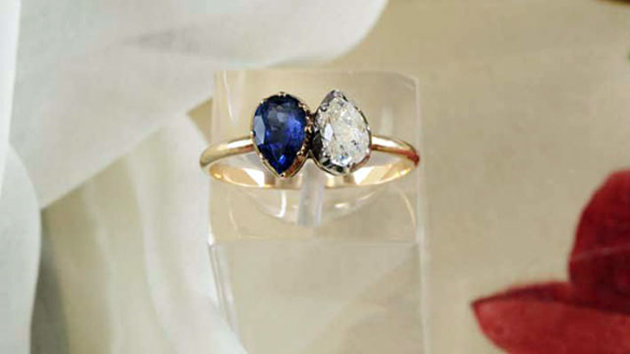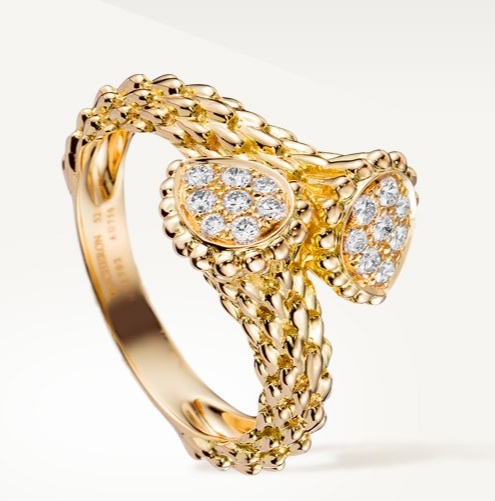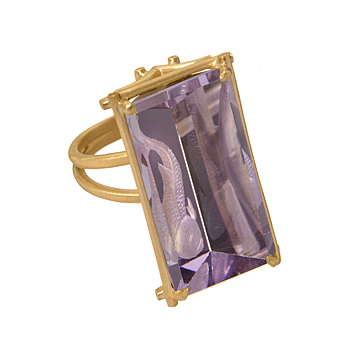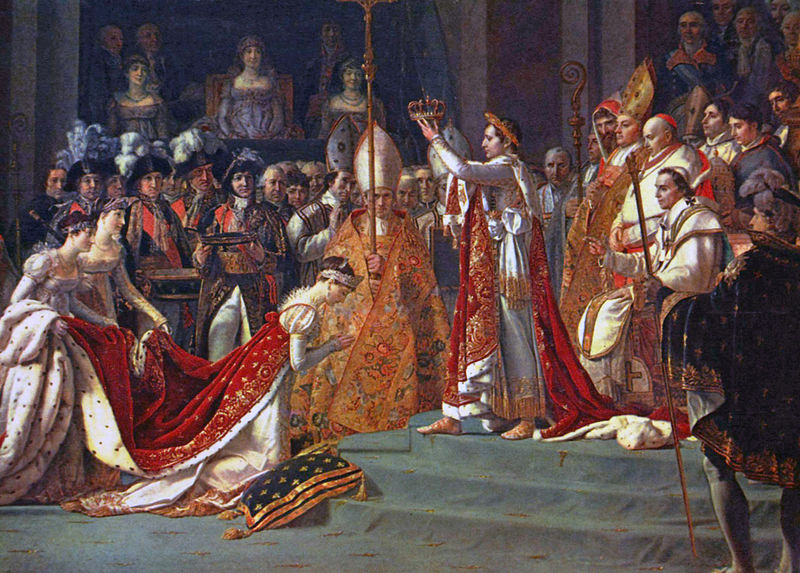I don’t know how I missed the original announcement of the auction of the diamond-and-sapphire engagement ring Napoleon gave to Josephine, but I’m quite disappointed. I would have loved to own this piece of history!
It was sold by the Osenat auction house in France, and I have to admit that the final, anonymous bid was a tiny bit over my budget: $949,000, before the buyer’s 25% commission to Osenat. Hilariously, the auction house had estimated the value of the gold ring — set with two gems weighing just under a carat each — at a mere $20,000. “We based the estimates in our catalog on the actual market value of the ring, minus Napoleon and Josephine provenance,” said Osenat’s Emily Villane, who led the auction. “It is not our job to tell bidders how much they should pay for the historical premium.” LOL WUT? Maybe they do things differently in France, but I can’t imagine that happening anywhere else. Face it: a plain gold pinky ring is one thing. A plain gold pinky ring owned by, let’s say, Anne Boleyn, and worn on her mythical sixth finger, is something else entirely. Even at nearly a million dollars, the Josephine ring went for a song, in my opinion. Certainly if I were a billionaire — or even a low-rent multiple-100s-of-millions-aire — I would have been prepared to go up to $2 million or $2.5 million for this one. I would then bring it home and sleep with it and kiss it for a couple of months, and then I’d give it to a museum where it could be shared with the world.
According to ABC News, the March 24 sale was timed to coincide with the 250th anniversary of Josephine’s birthday. Okay … the Encyclopedia Britannica says Josephine was born June 23, 1763. Close enough, I guess. At least, the story is correct in describing the ring design as a setting romantically known as “toi et moi” — “You and Me.” Here’s a modern-day “toi et moi” ring from Boucheron.
I’ve wanted to do a jewelry design in honor of Josephine for years. I’ve had a lot of ideas but none of them have felt like The One yet. Sometimes it takes me a very long time to decide on the perfect way to represent a royal woman (Napoleon ultimately made Josephine his empress.) My Queen Min ring — in honor of the last empress of Korea — was one of those that took me a while. I rejected several concepts before finally going with this one.
Josephine was a fascinating lady. Marie Josèphe Rose Tascher de La Pagerie — known as Rose — was born in Martinique to a wealthy Creole family that struggled financially after a hurricane destroyed its sugar plantation. An aunt who was the mistress of a French aristocrat decided to help out by arranging to marry off Rose’s younger sister to the aristocrat’s wealthy son, Alexandre de Beauharnais. But the sister died and the family sent Rose instead, as one does in such situations. Alexandre thought Rose was a country bumpkin, but, during a period of spousal estrangement, she eventually picked up social graces and became sophisticated and admired, despite her famously bad teeth. She and Alexandre had a son and a daughter, but after the start of the French Revolution — in 1794, during the Reign of Terror — Alexandre was arrested and sent to the guillotine. Rose, who was arrested too, would have been executed as well if not for the timely fall of one of the Terror’s masterminds, Robespierre, who went off to the guillotine himself. After the Terror ended and Rose was free, she had affairs with several leading politicians, eventually taking up with six-years-younger, up-and-coming General Napoléon Bonaparte in 1795.
Napoleon was entranced by the aristocratic widow, taken by the very elegance that her late husband thought she lacked. Having already changed the spelling of his own name from the Italian Napoleone Buonaparte to the French version, he christened his new love Josephine and sent her incredibly sex-ay love letters. One note from December 1795 starts, “To Josephine: I awake all filled with you. Your image and the intoxicating pleasures of last night, allow my senses no rest.” Hot. As Napoleon wrote the letter, he was expecting to see her in three hours, so he ends with: “Till then, a thousand kisses, mio dolce amor! but give me none back for they set my blood on fire.” HOTTER!
Napoleon and Josephine married in a civil ceremony in March 1796, despite his large, demanding family’s dislike of the cougar-ish 30-something widow with two kids. Unfortunately, duty called and just days after the wedding, Napoleon trotted off to invade Italy. He continued sending passionate letters to Josephine, often bemoaning the fact that she didn’t write to him as often: “Your letters are the joy of my days, and my days of happiness are not many,” he wrote in April, signing off with, “A kiss on your heart, and one much lower down, much lower!” Ooh la la! He returned to the lower-down kisses theme in a November 1796 letter:
“I cannot wait to give you proofs of my ardent love… How happy I would be if I could assist you at your undressing, the little firm white breast, the adorable face, the hair tied up in a scarf a la creole. You know that I will never forget the little visits, you know, the little black forest… I kiss it a thousand times and wait impatiently for the moment I will be in it.”
I die! Unfortunately, this wasn’t as much of a turn-on for Josephine, who was having an affair with an army officer named Hippolyte Charles. Napoleon didn’t find out about it until 1798, while he was invading Egypt. He’d desperately wanted Josephine to come with him on that particular business trip, but she cried and carried on about leaving France till Napoleon gave in and left her behind. As he once wrote, “Your tears rob me of reason, and inflame my blood.” Napoleon’s brother gave him the scoop about the lovah. Josephine denied everything at first and wrote to Hippolyte that she always knew that pesky family was going to cause her trouble. Heartbroken, the general promptly took a mistress to retaliate. When he returned to France in 1799, it was with plans to end his marriage, but a chastened Josephine cried those hot tears until he relented again. He never forgave her though and, while she apparently never had another affair, he flaunted his. Still, the couple stayed together as Napoleon gained more and more power in France. In 1800, at age 30, he became the First Consul, making him the top guy in France. In 1804, he went one giant step further by re-establishing hereditary monarchy. Tsk tsk. All that blood and gore of the Revolution and the Terror, and the country winds up right back where it was, except with an emperor instead of a king. In fact, by 1814 — the year he was forced to abdicate his throne and go into exile — Napoleon would echo Louis XIV, the king who declared, “I am the state.” Napoleon’s version, directed at France’s Senate, was:
“What is a throne? — a bit of wood gilded and covered in velvet. I am the state— I alone am here the representative of the people. Even if I had done wrong you should not have reproached me in public — people wash their dirty linen at home. France has more need of me than I of France.”
But that came much later and it was in no way Napoleon’s first boss-bitch moment. In fact, my favorite Napoleon-complex story about Napoleon is from the coronation, during which Pope Pius VII was supposed to place the crown on Napoleon’s head. Napoleon snatched it up and crowned himself. Basically, Napoleon was saying there was no one on earth who was capable of elevating him, not even God’s right-hand man. It was the 19th-century equivalent of a reality-television wig-snatching! Forget emperor … Napoleon should have named himself DRAMA QUEEN. After dissing the pope, Napoleon crowned reformed-cheater Josephine.
Josephine had been hanging onto her marriage for dear life. The relationship was roiled by the affairs, the family disapproval, and the fact that Josephine annoyed Napoleon by spending an awful lot of money while failing to produce an heir. She tried to secure her position by telling Pius the day before the coronation that she and Napoleon had never had a religious wedding ceremony. That meant they were living in sin, and Josephine couldn’t take part in anything sacred happening the next day — a scenario that would be a total downer for Napoleon. Napoleon was mad as hell about her sneak attack, but went through with an emergency remarriage ceremony conducted by his uncle, a cardinal. Josephine became a very popular empress (and a fashion icon who popularized the empire-waist gown), but the issues didn’t go away. One of the many, many problems with hereditary monarchies in the hereditary part. Even rulers who aren’t inbred crazies wind up with management problems. Sometimes they have a surplus of undesirable relatives with claims to the throne — so if you’re Richard III, for instance, you wind up having to kill your nephews. Other times a monarch has too few desirable heirs, like sons. At the time of her coronation, Josephine was in her early 40s with no sign of a Napoleonic bun in her oven. Napoleon figured he could work around this by passing his snatched crown along to Josephine’s grandson (the offspring of Napoleon’s younger brother Louis and Josephine’s daughter Hortense de Beauharnais), but the child died in 1807 before he turned five.
Therefore, by 1809, Napoleon was in a full-blown Henry VIII-worthy “Oh shit, I’ve got no son” frenzy, and he told Josephine he needed to find a gal with livelier reproductive organs. Fainting and tears didn’t work this time. The ticking of his biological clock was all Napoleon could hear. He figured he already had some illegitimate children, so the trouble had to be with Josephine. The divorce took place in January 1810. Like modern-day celebrities telling People magazine that they’ll always be best friends with their ex-spouses, the couple made friendly statements about each other. Napoleon blamed the divorce on his love of France and told the world that Josephine would always be an empress to him:
“God knows what such a decision has cost to my heart! But there is no sacrifice that is beyond my courage if it is shown to be for the good of France. I must add that, far from having any reason for reproach, I have nothing but praise for the attachment and the affection of my beloved wife: she has graced fifteen years of my life; the memory of them will remain engraved in my heart. She was crowned by my hand; I desire that she retain the rank and title of crowned empress, but more than this, that she never doubt my feelings and that she value me as her best and dearest friend.”
In March, Napoleon married Marie-Louise of Austria of whom he reportedly said, “I have married a womb.” Marie-Louise did her job and became pregnant that summer, giving birth to Napoléon François Joseph Charles Bonaparte — dubbed the King of Rome by his proud dad — in 1811. The year after that, though, Napoleon tried to expand his empire by invading Russia. It was a disaster. He went with 600,000 men and returned with 100,000. Not the kind of thing that makes a guy popular. As his military strategies failed left and right, he was forced to abdicate his throne in 1814. Exiled to the island of Elba without his wife and child, he did NOT create the palindrome, “Able was I ere I saw Elba.” However, he did escape and attempt a comeback, only to to have his new army beaten so completely by a group of allied nations that the name of the battle has come to stand for utter defeat: Waterloo.
Napoleon was again sent into exile, this time to the escape-proof island of St. Helena. Marie-Louise and his son didn’t join him; he never saw them again. Marie-Louise went on to have two children with another man while Napoleon was still alive. (After his death, she married her Austrian general lovah and had one more child.) The woman who did keep Napoleon in her heart to her literal dying day was Josephine. She succumbed to a respiratory illness in 1814, a little more than a month after her ex-husband was sent to Elba. His name was among her last words. When he got the news, he refused to see anyone for two days. When Napoleon himself died seven years later on St. Helena, his last words were said to be: “France, armée, tête d’armée, Joséphine.” Translation: France, the Army, the head of the Army, Josephine.
Napoleon’s much-yearned-for son reigned as Napoleon II for about a week in 1814, when he was three years old. That occurred between the time Napoleon abdicated personally and then abdicated on behalf of the descendent he’d worked so hard to procure. The son lived in Austria after 1815, where he was known as Franz. As an adult, having discovered that two of his half-siblings were conceived before his mother married his stepfather, Franz told a friend, “If Josephine had been my mother, my father would not have been buried at Saint Helena, and I should not be at Vienna. My mother is kind but weak; she was not the wife my father deserved.” In the afterlife, Josephine probably murmured “Damn straight.”
Obviously, I have left out a few million facts (and probably garbled some others) in this ultra-short summary of Napoleon and Josephine. If you want the real deal, I recommend the following female-focused non-fiction books (we can find accounts of Napoleon’s wars anywhere, non?):
- The Rose of Martinique by Andrea Stuart
- Napoleon: His Wives and Women by Christopher Hibbert
If you like historical fiction, try this trilogy by Sandra Gulland:
- The Many Lives and Secret Sorrows of Josephine B.
- Tales of Passion, Tales of Woe
- The Last Great Dance on Earth
By the way, if you had all the money in the world … how much do you think that engagement ring is worth now? I, for one, might be raising my bid.




I think Family Guy needs to do an episode where Josephine’s teeth meet Steve Buscemi’s 🙂 Teehee.
Napolean was saucy! He could have written a helluva romance novel!
It’s impressive that he had time to write those great letters in the middle of a war, isn’t it!
What a hell of a ring! I do have to wonder who’s finger it might grace some day.
Napolean sounds like a man obsessed! Disappointing his latter life was such a shamble, he could have been another name for Mr.Lovah-lovaH!
I wouldn’t wear the ring, I would just cuddle with it.
If I had all the money in the world, that ring would be mine! It’s beautiful. Napoleon’s lurrve letters were totally wasted on that ungrateful bint.
So exciting to see the plug for Sandra’s books! She lives one town over from where I grew up, and is a fascinating and creative lady…and those books weave quite a tale. Some of my favourites!
Oooh I knew you’d blog about this ring! I read about it a few days ago and now I want a “toi et moi” ring too!
This ring is so simple, but already speaks volumes.
And who would’ve thought that Napoleon was great at sexting too?
PS: Your blog post beats all the History books I’ve read. Woman, write a book and earn millions 😉
I read somewhere that Jackie O’s pearls were similarly valued in the first auction, now they are at their proper celebrity-worn value – http://news.instyle.com/2010/08/03/up-for-auction-jackie-kennedys-pearls/
Silly auction peeps!
It does seem like the ring should be worth more.
What a funny rendering of two of my favorite historical characters. Around the house we refer to Napolean as “the little shit of history.” The lust letters make him sound so romantic, but there were other less romantic utterances, like “bring me a woman” while on some military campaign. He was a pretty busy rapist.
I love that painting!
“He was a pretty busy rapist.” — LOL, true that!
DUHHHH, provenance makes a huge difference to the value of jewelry and art. HELLO! cripes.
LOVE LOVE LOVE the purple ring. absolutely stunning!
Oh, those silly French peeps!
Your version of the Napoleon & Josephine romance was way better than wikipedia’s and Encyclopedia Britannica combined! I didn’t know about those hotter than hot
‘sex-ay’ love letters he sent. It seems Napoloeon is the original 50 Shades!
Read the rest of the letters! They’re all fabulous.
Beautiful ring, and I don’t even like sapphires! I could see you wearing it however. Bummer! Typical the French often do things that way. My friend in Paris works with auction houses and she’s amazed that they will under-value something that belonged to someone important. So I guess I’m not surprised. XXX
It’s some kind of reverse snobbery — “oh, those people aren’t that important.”
They’re odd, they’ll keep the same vintage stock in their shops for honestly at least 3 or 4 years. What? Too attached? Bah! XXX
Quelle horreur!
Mais oui, mon amie! They are l’unatique!